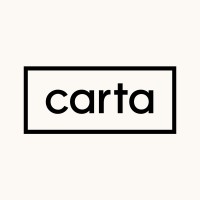Carta streamlines equity management processes for companies, investors, and employees through its comprehensive platform. It offers tools for equity plans, cap table management, valuations, and more, simplifying the complexities of equity management and fostering transparency and efficiency.
Overview
Open Pricing Index
Carta's pricing model reflects the complexity and value it brings to equity management, with packages designed to suit different company sizes and requirements. Customers can expect to invest between $4,536 to $9,210 annually, depending on their company size, to access Carta's robust equity management tools.
Plans and pricing
Prices are based on real Cledara data and are stated in as yearly costs in USD. The prices are based on the 25th, 50th, and 75th percentile and will include the full cost (including items such as tax)
Cledara’s Take
Carta is well-regarded for its core functionalities like cap table management and investor relations. It's especially handy for keeping track of vesting schedules and managing equity-related processes smoothly. Users appreciate how it updates vesting and exercise details in real time with a user-friendly interface, which can make life easier for both teams and shareholders.
What is Carta used for?
Carta is renowned for making equity and cap table management a seamless affair, serving as the go-to platform for companies aiming to manage their equity more efficiently and transparently.
Use cases
Equity and cap table management
Carta excels in simplifying the management of equity and cap tables, ensuring accuracy and transparency for both employers and employees.
Investor relations and scenario analysis
The platform facilitates robust investor relations and scenario analysis, enabling simulations of financing outcomes to assess their impact on equity.
Integration and usability
With its user-friendly interface and integration capabilities, Carta streamlines equity management, making complex processes more navigable.
Carta main features
- Cap table management simplified
Offers precise tracking of stock and equity grants. - 409A valuations for compliance
Provides valuation services to ensure tax compliance. - SAFE financing tools
Supports efficient management of SAFE financings. - Comprehensive financial reporting
Enables clear and compliant financial reporting. - Equity plan advisory services
Offers expert guidance on equity plan management. - Liquidity solutions for stakeholders
Facilitates liquidity events for company stakeholders. - Total compensation analysis
Delivers insights into overall employee compensation.
What do people think of Carta?
We aggregated reviews from various sources to compile feedback that accurately reflects Carta’s user experience and satisfaction levels.
View on G2 (4.5 stars) View on Capterra (4.3 stars)
Carta highlights
- Integration with HRIS Systems
This integration is crucial as it potentially simplifies how HR departments manage equity compensation, a critical part of total rewards in tech and other sectors. - User-friendly interface
Users find it straightforward to navigate, which lowers the barrier for employees and management to access and understand their equity information. This ease of use extends from viewing vesting schedules to managing complex equity transactions, making it accessible for users with varying levels of financial expertise. - Equity management tools
These tools are designed to centralize and streamline the process of equity management, making it easier for companies to maintain accurate and up-to-date records. The clear display of grants and vesting schedules further enhances the tool's utility.
Carta concerns
- Pricing
There are instances where long-term customers have experienced substantial rate hikes, which seems disproportionate to the scale of their user or feature expansion. This can be a particular pain point for smaller companies or startups with tight budgets who may find these increases challenging to absorb. - Customer service
While some users report positive interactions and prompt support, others indicate that the transition to automated systems and chat functions has decreased the quality of support received. Difficulties in dealing with more complex issues or getting personalized assistance are commonly cited issues, which could be frustrating for users needing immediate and specific help. - Functionality
While Carta is strong in basic and intermediate equity management functions, it seems to struggle with more complex scenarios like detailed financial simulations and specific reporting needs. Users have reported errors and inadequacies in simulation tools and expressed a desire for greater transparency and access to underlying data and assumptions in reporting outputs.


The Leading SaaS Tools of 2024
Discover real pricing average per tool, and much more.







%2016.41%202%20(2)-min%20(1).jpg)